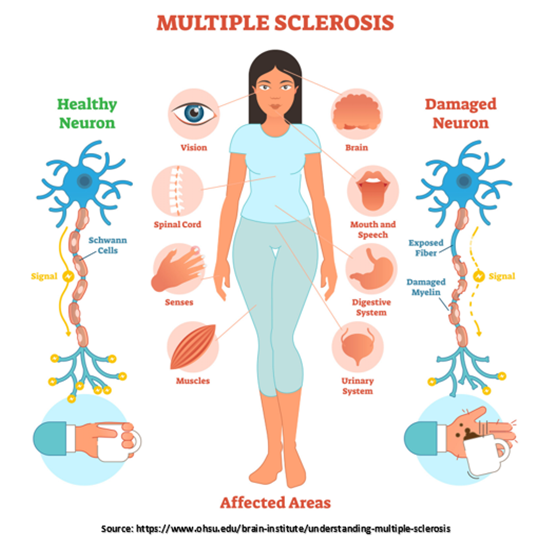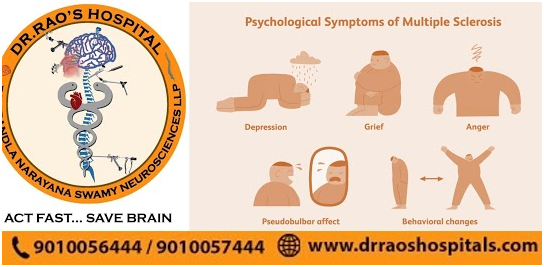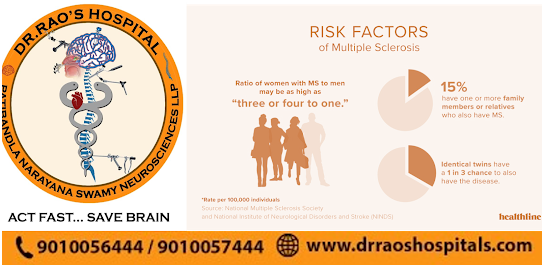Multiple Sclerosis Treatment in Guntur, Andhra Pradesh
Multiple sclerosis-MS is a central nervous system (the brain and spinal cord) disease that can affect people of all ages. In this condition, the immune system destroys nerve fibers and myelin sheath, a fatty material that coats and protects healthy nerve fibers in the brain and spinal cord. If left untreated, this disorder can affect the quality of life and the ability to perform routine tasks. Hence, patients diagnosed with multiple sclerosis should receive immediate medical care to live healthy life.

Dr. Rao’s Hospital offers comprehensive multiple sclerosis treatment in Guntur, Andhra Pradesh. Dr. Rao’s Hospital is considered one of the best neurology hospitals in Guntur. Moreover, it is the first healthcare facility in India to provide all types of neurological and under one roof.
Our founder, Dr. Mohana Rao, is one of the best neurosurgeons in India. Dr. Rao specializes in neurosurgical procedures to manage brain, spinal cord, and peripheral nerve conditions. Dr. Rao has a team of seasoned and skilled neurosurgeons and neurologists in Guntur. They have efficiently dealt with patients having minor to complex neurological disorders.
First, let’s know,
What is Multiple Sclerosis, and How does it affect you?
Multiple sclerosis (MS) is a neurological condition that affects the central nervous system. The disorder interferes with the brain’s ability to communicate with other body areas. Its consequences can vary from moderate to destructive.

MS is an autoimmune disease in which the immune system begins to attack body tissues. In MS, the immune system attacks myelin, the fatty material that coats nerve fibers in the spinal cord and brain. Myelin is a matter that acts as insulation for neurons.
Let’s see,
What are the symptoms of multiple sclerosis?
The symptoms of multiple sclerosis differ greatly depending on where the affected nerve fibers are located. Below are some of the warning signs that might appear:
- Weakness or numbness in limbs.
- Visual deficiency, including partial or total blindness.
- Double or blurry vision.
- Tingling or ache in different areas of the body.
- Sensation of electric shock in various body areas due to specific head movements.
- Dizziness
- Weakness and fatigue.

Now, let’s know,
How is multiple sclerosis diagnosed?
Our multiple sclerosis doctor in Guntur will accurately diagnose the disease by ruling out other conditions that cause similar symptoms. The doctor can order the following examinations:
- Blood test
- Magnetic Resonance Imaging (MRI)
- Lumbar puncture (spinal tap)
- Evoked potential test

Which are the different phases of multiple sclerosis?
- RRMS-Relapsing-Remitting:
People with multiple sclerosis may experience non-worsening symptomatic episodes with or without changes.
- SPMS-Secondary-Progressive:
This phase begins after several years of RRMS and shows changes in patterns from relapsing to progressive between the episodes.
- PPMS-Primary-Progressive:
From the start, there is a gradual onset with no episodes.
- PRMS-Progressive-Relapsing:
A few unusual cases of multiple sclerosis start as a progressive disease that develops into attacks.
- Fulminant:
It is a rare form of multiple sclerosis that is debilitating and progresses quickly.
Let’s discuss,
How is multiple sclerosis treated?
The goal of treatment is to reduce the signs and symptoms of this immune condition. Since some patients have minor signs, they may not need treatment. The neurologist may prescribe the following treatment plan:
Medications
Corticosteroids and plasma exchange medications can treat symptoms; Immunomodulators that prevent attacking the myelin like ocrelizumab, Glatiramer acetate, Fingolimod, etc.
Symptomatic treatment is most important in reducing spasticity, numbness, fatigue, and bowel or bladder issues.
Therapies
Physical therapy, like strengthening and stretching, will help alleviate symptoms and make it easier to carry out everyday tasks.
Lifestyle changes
- Introducing minor dietary modifications, such as eating a well-balanced diet.
- Exercising regularly.
- Staying in touch with friends and families.
Now, let’s know,
What causes multiple sclerosis?
There is no known reason for multiple sclerosis. Still, four factors play a significant role in rooting the condition:
- Immunologic factors
- Genetic factors
- Environmental factors
- Viral infections
What are the preventive measures for multiple sclerosis?
To avoid this condition, one should take the following precautions:
- Avoiding smoking.
- Consuming a healthy diet.
- Maintaining physical fitness.
What are the risk factors for multiple sclerosis?
The primary risk factors for this condition include:
- Stress
- Smoking
- Lack of sleep
- Infections
- Age
Make an appointment at Dr. Rao’s Hospital, one of the top multiple sclerosis hospital in Guntur, to get effective treatment for multiple sclerosis.
Frequently Asked Questions:
Is MS a hereditary or contagious disease?
MS isn’t hereditary or contagious in any way. Genetic and environmental variables may have a role in the development of this condition.
Is it possible to treat MS permanently?
Currently, there is no permanent cure for MS. However, the available treatment options can alleviate symptoms and improve quality of life.
Is it possible to live a regular life with MS?
Most MS patients can live a normal life. The average lifespan of those with MS is a few years less than that of the general population.
What is the severity of multiple sclerosis?
MS is rarely lethal; however, MS in advanced stages can cause lung or bladder infections or swallowing problems.
Enquiry Now

